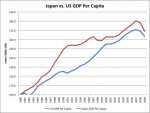- Joined
- Sep 24, 2011
- Messages
- 38,257
- Reaction score
- 44,189
- Location
- Atlanta
- Gender
- Male
- Political Leaning
- Independent
I posted evidence, it was in the link
How much Stimulus did Japan blow through in the 1990's ?
They spent 100 trillion yen via 10 seperate Stimulus initiatives and invested heavily on infrastructure.
Their economy remained stagnant while their debt shot up exponentially.
Under Abenomics they had four more Stimulus packages and their economy actually contracted.
Obama's stimulus failed to meet his OWN standards and we've spent Trillions more since 2009 and our economy is still on life support.
How is any of that not evidence ??
Because what Japan experienced was a liquidity trap on the back of a massive asset bubble.
A sudden collapse in asset values and the stock market plummet created a condition where too many of their financial organizations held assets worth less than their liabilities against them. Stimulus, nor Keynesian economics, caused their lost decade. Japan literally had organizations living off government infusions of capital who were by effect zombie banks, with net worth's less than zero but still holding assets. Their stagnant economy was not based in improper economic theory, but rather crony capitalism where organization that should have failed did not. Toxic debt never left and eventually over a very long time banks all consolidated at the hands of government interference. Credit never did stabilize and that caused the their economic troubles to take a very long time to navigate through, in some cases they still have underline problems as their aging population is about to make matters worse. They never did have a good application of QE and their aggregate demand problems suffered set back after set back because of the underline asset valuation collapse.
Your link is a political attempt to brand all of Japan's problems as Keynesian caused, but there is no real data to support that conclusion.
And not a bit of this is applicable to Canada anyway, their economic concerns are entirely different as is their present fiscal condition and monetary policy controls. You have failed to derail another thread bashing on economic theory you seemingly know little to nothing about.

